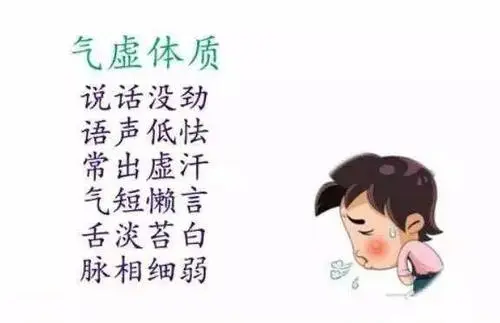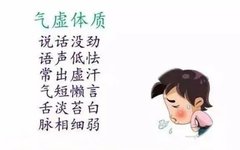
When consulting a Traditional Chinese Medicine (TCM) practitioner, the term “Qi deficiency” (qì xū) is often mentioned. Qi deficiency syndrome refers to symptoms such as pale complexion, shortness of breath, low voice, fatigue, breathlessness upon exertion, spontaneous sweating, poor appetite, loose stools, pale white tongue coating, weak pulse, and symptoms of spleen and lung Qi deficiency such as prolapse of the rectum or uterine prolapse. Let’s explore the manifestations of Qi deficiency and how to regulate it!

01
What are the Symptoms of Qi Deficiency?
1. **Lung Qi Deficiency** (fèi qì xū)
The lungs govern Qi, control respiration, and connect with the skin and hair, regulating the water pathways. When Lung Qi is deficient, its functions of dispersing and descending, regulating fluid metabolism, and resisting external pathogens weaken, leading to symptoms such as shortness of breath, spontaneous sweating, low voice, cough with wheezing, chest tightness, susceptibility to colds, and even edema or difficulty urinating.
2. **Kidney Qi Deficiency** (shèn qì xū)
The kidneys reside in the lower back, store essence, and control the opening and closing of the two yin. Essence nourishes the five organs and ascends to enrich the brain and marrow. When Kidney Qi is deficient, it fails to nourish, resulting in symptoms like fatigue, dizziness, forgetfulness, weakness in the lower back and knees, frequent clear urination, thin and clear vaginal discharge, pale tongue, and weak pulse. If the kidneys cannot hold Qi, breathing becomes shallow and rapid.
3. **Spleen Qi Deficiency** (pí qì xū)
The spleen is located in the middle jiao, responsible for transformation and transportation, ascending clear Qi, and regulating blood flow. When Spleen Qi is weak, it cannot transform food and fluids effectively, leading to insufficient Qi and blood production, resulting in reduced appetite, discomfort after eating, fatigue, weight loss, loose stools, sallow complexion, pale tongue with thin coating, and weak pulse.
4. **Heart Qi Deficiency** (xīn qì xū)
The heart governs blood vessels and houses the spirit. When Heart Qi is deficient, it cannot propel blood circulation or nourish the spirit, leading to symptoms such as palpitations, shortness of breath, excessive sweating, fatigue, pale tongue, and weak pulse.
5. **Yang Qi Deficiency** (yáng qì xū)
Qi deficiency may present with a pale complexion, dizziness, low energy, fatigue, and in severe cases, fainting. Yang deficiency, in addition to Qi deficiency symptoms, also includes cold intolerance, cold limbs, spontaneous sweating, a deep and slow or weak pulse, and a pale, swollen tongue with white coating.

02
How to Regulate Qi Deficiency?
1. Eat well and nourish the spleen and stomach. TCM believes that the spleen and stomach are the foundation of postnatal life and the source of Qi and blood production. Therefore, nourishing the spleen and stomach is crucial for replenishing Qi. In daily life, we should avoid spicy, greasy, and stimulating foods, as they hinder digestion and increase the burden on the spleen and stomach, depleting Spleen Qi and worsening Qi deficiency. Common foods that strengthen the spleen and stimulate appetite include hawthorn (shān zhā), pumpkin (nán guā), and millet (xiǎo mǐ). Additionally, red bean (hóng dòu), coix seed (yì rén), and job’s tears (qiàn shí) porridge is highly recommended, as it not only strengthens the spleen but also eliminates dampness, helping the spleen and stomach restore normal physiological function.
2. Engage in aerobic exercise under sunlight. Life is movement. Regular aerobic exercise can strengthen the heart and limb muscles, and improve lung capacity. Furthermore, exercising in sunlight can help replenish Yang Qi. A gentle reminder: if Qi deficiency is severe, it is advisable to walk slowly to prevent excessive Qi depletion.
3. Maintain a regular sleep schedule and avoid excessive physical and mental strain. In addition to insufficient Qi leading to Qi deficiency, excessive depletion is also a significant cause. Therefore, in daily work, we should pay attention to balancing work and rest, minimize late nights, and cultivate good lifestyle habits. When facing stress, learn to let go; there is gain in loss, and do not let stress overwhelm your body.

——Previous Reviews——
|
Health |
Effects and contraindications of deer antler paste |
|
Wellness |
Effects and methods of chrysanthemum and cassia tea |
|
Encyclopedia |
Effects and contraindications of red bean porridge |
|
Science |
Effects and contraindications of black sesame |
|
Knowledge |
Effects and contraindications of chrysanthemum and cassia tea |
END
Dear reader, if our article has been helpful to you,please mark us as a favorite ★ so you won’t miss our daily updates!

【Disclaimer】: This article is sourced from the internet, and copyright belongs to the original author. Please indicate the source when reprinting. Sharing this article is for the purpose of dissemination and learning exchange, and we do not take responsibility for the views expressed in the article. The various dietary therapies, medicinal formulas, and prescriptions mentioned are for reference and learning only; non-professionals should not use them blindly! The advertisements in the article are automatically generated by the system and are unrelated to this account. If you have any questions, please leave a message online, and we will handle it as soon as possible. Thank you.
Click to spread health and share knowledge~👉

